DCPA NEWS CENTER
Enjoy the best stories and perspectives from the theatre world today.
Enjoy the best stories and perspectives from the theatre world today.
The Broadway presentation of Tootsie marks the first time that the musical has stopped in Denver, but it certainly may not the first time that movie fans have seen it. Tony Award-winning Book Writer Robert Horn gives us his insight into the differences, similarities and the unexpected elements in this production that separate it from the beloved 1982 movie.
DCPA: How did the idea to adapt Tootsie for theater come about, and what excited you about this idea?
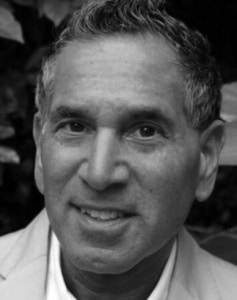
Robert Horn. Photo courtesy of Playbill.
ROBERT HORN (RH): Everything about theater excites me…and also gives me heartburn. The idea came from our prolific and wonderful producer, Scott Sanders, who had the rights to the movie. He had seen a workshop I had done for another musical, and when the legendary Larry Gelbart, who wrote the film and was adapting the musical, passed away, Scott went on a desperate search to find someone to fill Larry’s comedic shoes. Somehow his GPS pointed towards me and I am forever grateful.
When he approached me about it I got very nervous. I mean, it’s an iconic movie and comic masterpiece, but it also has content and plot points that I knew did not age well. I was terrified to take it on at first and passed on the offer. But then I sat down with the composer, David Yazbek, and we talked out all the ways we could make it our own, update it, go back to just the DNA of the story and rebuild it out from there. Use humor to tell the story in a theatrical and modern way.
For me, having been in show business for a while, I totally understand that ominous question we all eventually face: what happens when the time comes that no one wants you…when you’re told you can no longer do the one thing you love most in the world? How far would desperation take you? It’s something that haunts everyone in this business, no matter how successful. To me, that was a story worth building on…since it feeds my neurosis constantly.
DCPA: Tootsie is such an iconic film. What was your process of adapting this for the stage, and what were the greatest challenges you faced?
RH: Again, I knew from the beginning I didn’t want to just adapt the movie for stage. The movie had been done already, and incredibly well. And I have my own point of view about whatever story I’m telling. My own comedic language and craft. This assignment was about creating rather than recreating.
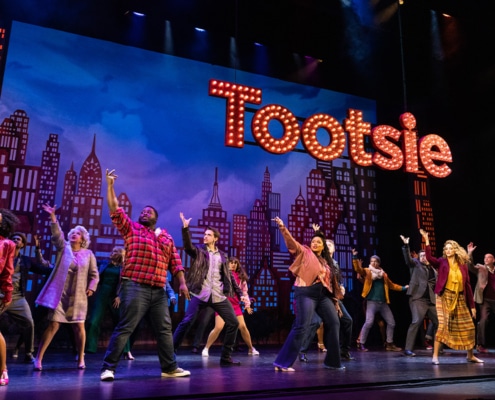
For David and me, it was about starting over and making a new musical with the bones that were already there. Adapting it for an ever-changing social zeitgeist, creating a piece of work that sang, but also building it as something theatrical rather than cinematic [with the guidance of the brilliant Scott Ellis, our director]. There were huge minefields to cross. We took our time with it, made choices, studied every beat. Asked questions. Talked to greater minds than ours. It took two years just to get a first draft done. Then, from there, we started.
DCPA: What are biggest differences between the film and the Broadway musical, and would you like to explain why you made some of these choices?
RH: There were a number of large shifts, obviously the main one was taking it out of the world of Soap Opera, for a number of reasons. That artform felt dated and didn’t have the social reach it did in 1982 when the movie was released, which changed the story a lot. Also, trying to put a ‘TV’ show on stage is not often successful for a musical and would have created a whole world of challenges. We decided to put it in the world of musical theater because it felt organic to it becoming a musical…a reason for them to sing. As well, theater is such an insular community. To have the story take place in that world raised the stakes for the other characters. It all just felt like a natural shift in how we wanted to present our version of this.
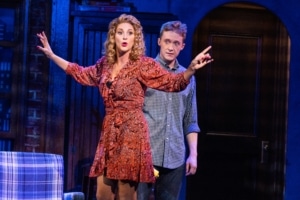
Payton Reilly as Sandy Lester and Drew Becker as Michael Dorsey in the National Tour of TOOTSIE. Photo by Evan Zimmerman for MurphyMade.
RH: Another shift that needed to happen was the point of view of the female characters in the story. It was important they reflect the impact and progress women have made in society and art since the days of the original film. There is both a strength and vulnerability to the women portrayed in the musical that I think, sadly, might not have resonated back in the early 80’s…but again, as we progress culturally, so must our art. When a future society looks back at a certain time in history, it will be able to define that moment in time by the art that was created. In our show, Julie does not grow by virtue of being around Michael; Michael changes and grows because of his experience of being with Julie – a woman who navigates her own obstacles with determination and confidence.
DCPA: What is the intended impact of Michael Dorsey disguising himself to act in a Broadway show (rather than a soap opera), and how did it feel writing that from the perspective of a member of the theater industry?
RH: Again, I like a story where the protagonist isn’t always a great character at first, but you relate to their journey, their desperation, their desires and wants, so you follow them to watch them grow and change. We are living in ever shifting times and there is a social responsibility on all of us to adapt to changes and learn to grow from what we might not have understood just a short time ago.
Also, I relate to Michael’s reasons for being desperate, and the mistakes he makes on his journey to enlightenment…though I try not to emotionally injure people along the way as he does. Thankfully, his life is probably a much better drama than mine. And most of all, I loved the idea of writing a musical that celebrates musical theater, its quirks and flaws and stunning camaraderie. The sacrifices we make just for the opportunity to do what we love most. The family we create along the way. Theater is a unique culture that brings people together in a way very few others do.
DCPA: What would you say are the greatest highlights of the show?
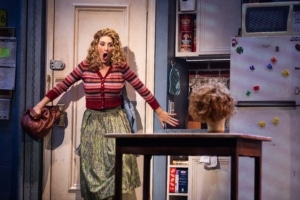
Payton Reilly as Sandy Lester in the National Tour of TOOTSIE. Photo by Photo by Evan Zimmerman for MurphyMade.
RH: The real commerce of this show is its comedy. Its tone. And of course, the clown car of actors that brings it to life every night. The comedy comes at you with such love, then there are these hysterical songs by David Yazbek that at once have you laughing and moments later thinking. Add to that the way Denis Jones uses dance to forward the action with such humor and style, and David Solomon recreating Scott Ellis’ staging but adding his own comedic sensibility and timing that keeps the show moving like a bullet train, and it adds up to a glorious night of musical comedy.
DCPA: Why do you think the story of Tootsie remains so beloved worldwide, decades after the film came out?
RH: I think comedies have a longer shelf life than certain other genres of film. And I think the film was masterful and so even though it becomes problematic as we shift culturally, there’s no denying its craft. I also think somewhere in us all there is desperation, and also hope – hope that we can be better, that we can change, that we can walk in someone else’s shoes and be part of a community. This is a story of community – of a group of people who love each other and just want to do what they love most, even if the world might have other plans for them!
DCPA: Congratulations on earning the Tony Award® for Best Book of a Musical. How did it feel to receive that honor, and what do you think makes the book of this show so very special?
RH: Thanks! I won’t lie, it was a surreal and humbling moment when you hear your name. Having worked so hard for so many years and having learned to accept constant rejection as a way of life, but to never have given up even after the 1000 times you want to, then getting validation from your peers that your work might actually be respectable is all overwhelming. But the best part of that was getting to spend time with the other book writer nominees and the friendships that were made. You’re shot out of a rocket and for six weeks; it’s insanity, and you do it together with artists who you are learning from.
As for the book, “special” is such a subjective thing, but thank you! I do think I worked painfully hard to make it incredibly funny, hopefully touching at times, and to invite the audience to be a part of the humor, not just observers of it.
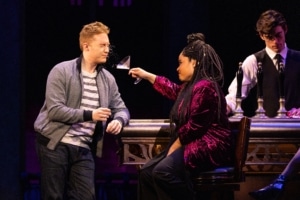
Drew Becker as Michael Dorsey and Ashley Alexandra as Julie Nichols in the National Tour of TOOTSIE. Photo by Evan Zimmerman for MurphyMade.
No book of a musical exists without a score, and David and I worked together to create this. I think the secret to a successful book is how seamlessly it can work with the score, that it feels like one person wrote it all. David Yazbek and I laughed for three years non-stop creating this show, and I think that joy and left-of-center humor has its handprint throughout what you see onstage. Also, David is insane in the most glorious way, and my absolute love of collaborating with him is a huge part of what makes the show so joyous.
DCPA: Is there anything else you would like to add about creating the show, what makes it so wonderful, or why people should go see it?
RH: When I watch audiences watch the show and hear that tsunami of communal laughter that just builds and builds throughout the night and lifts the ceiling, I wish I could let audiences know that writing the show was that exact same experience. Constant laughter, community, self-reflection, joy, friendships, and a love of this artform.
Also, supporting the arts SAFELY right now is a vital step in creating a new normal and getting back to our lives. And what better way to come out of the cave of isolation we’ve all been in, than with laughter!
DETAILS
Tootsie
Mar 29 – Apr 10 • Buell Theatre
